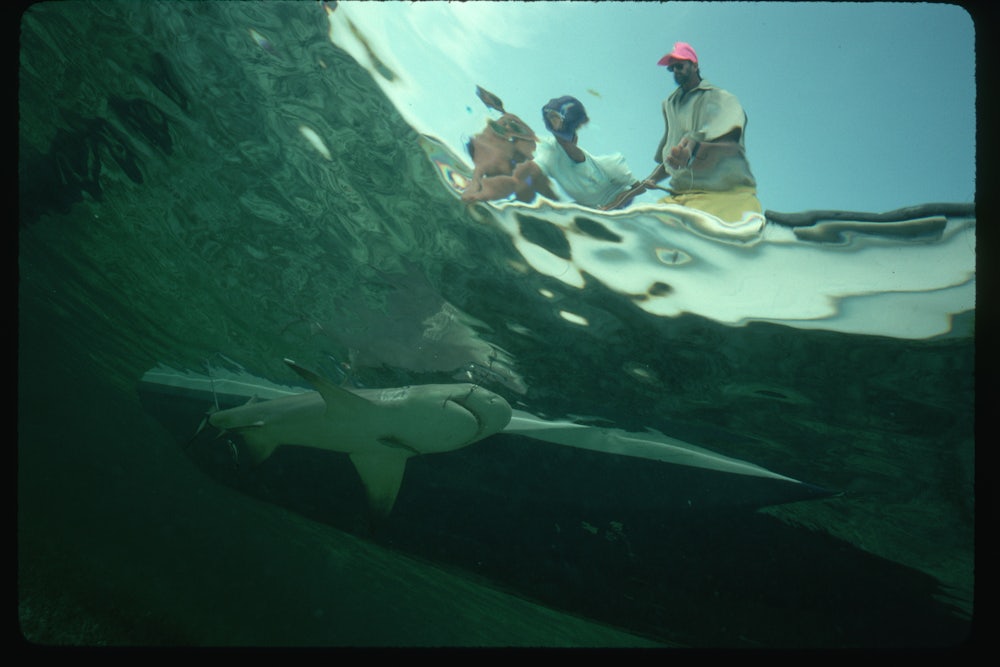John R. Moore and Tanner Mansell are facing up to five years in prison and $250,000 in fines. Their crime, according to the West Palm Beach jury that convicted them last month, was freeing 19 sharks and a Goliath grouper from a commercial fisherman’s net in federal waters and for stealing the gear, costing the owners of the rig about $1,500 in fishing longline and several thousand dollars’ worth of catch—a fraction of the money Moore and Mansell could now be forced to pay.
According to the U.S. Attorney’s Office, 56-year-old Moore, a former commercial fisherman and underwater photographer, and mate 29-year-old Mansell, both licensed by the U.S. Coast Guard, took six tourists out to the Jupiter Inlet in August 2020 for a shark diving expedition. There, they came across a controversial netting designed to trap large quantities of fish. Moore told prosecutors he saw no orange buoy to indicate a legal shark fishing effort, even though video from his passengers later showed it was there. Telling passengers this was an illegal, abandoned rig, Moore and Mansell, with the help of their passengers—including a Midwestern police chief—worked for over three hours to free the trapped fish. They also called state officials to report the netting.
Because a buoy designating the net as legal was later found to have been present, Moore and Mansell were prosecuted and are now due to be sentenced on February 9. (They could also be forced to pay restitution to the fishing operation, in addition to the other penalties.) Their case highlights a growing divide between citizens seeking to help Florida’s local ecology and the politicians and lawyers defending an outdated system that conservationists say supports corporations and lobbyists.
“I believe that the action taken by these gentlemen is part of an overall contentious atmosphere that has been building with wildlife management in Florida, particularly for sharks and Goliath Grouper,” said Dr. Chris Malinowski, director of research and conservation at the Ocean First Institute, who added that he disagrees with Moore and Mansell’s approach. “You have some stakeholder groups saying these species should never be harvested because their populations are low, while other groups claim there are way too many and that state and federal authorities need to take immediate action to reduce numbers.”
For decades now, the quality of life in Florida’s waters has been suffering due to overfishing, pollution, and rising temperatures as a result of climate change. A recent study by the University of Miami Rosenstiel School of Marine and Atmospheric Science and the National Oceanic and Atmospheric Administration found that 85 percent of popular grouper and snapper species have been overfished, with their populations sinking below sustainable levels. Globally, shark populations have decreased by 71 percent over the past half-century due to shark finning and overfishing, with numerous shark species surrounding Florida experiencing steep decline. More than one-third of sharks worldwide are in danger of extinction.
The fish Moore and Mansell freed included vulnerable species. The lemon shark, for example—reportedly one of the species they freed—is currently on the International Union for Conservation of Nature’s Red List of Threatened Species. “Overall,” the IUCN found in 2020, “it is suspected that the Lemon Shark has undergone a population reduction of 30–49% over the past three generation lengths (50 years).” Due to overfishing, the catching and killing of near-extinct Goliath groupers was prohibited for three decades, but plans were announced in 2022 to lift the ban provided a strict lottery system was implemented. (The Florida Fish and Wildlife Conservation Commission has now postponed its final ruling on this till at least May 2023.) Moore and Mansell’s crime took place in federal waters, not state waters. But the Goliath grouper has been protected in both state and federal waters since 1990.
Many conservationists disagree with the decision to end the Goliath grouper fishing moratorium. “Although there has been some recovery of a few shark species and of Goliath grouper in Florida’s state and federal waters,” said Malinowski, “further recovery is still needed in order to reach an appropriate ecosystem balance in Florida. Goliath grouper populations showed positive signs of recovery until around 2010, but have since showed signs of population declines.”
There are some signs that public opinion is finally shifting toward conservation, even for sharks, which, like many predators, often face an uphill battle to gain public sympathy. The longtime villainizing of sharks in popular culture—from the Jaws and Sharknado movie franchises to even some of Discovery’s annual Shark Week programming—has left a lot of fear of these animals. But last July, a sanctioned shark fishing tournament in Palm Beach County, where Moore and Mansell were convicted, encountered large-scale backlash in its lead-up, generating over 185,000 signatures on Change.org and protesters on location.
Floridians’ growing discomfort with shark fishing could also be seen as part of a developing national conversation over animal rights, exemplified by a recent, popular Los Angeles Times op-ed by philosopher Martha C. Nussbaum asking whether animals deserve the same rights and justice as citizens. But for every supportive voice of this nature, one could point to equally intense resistance—from the recent court case challenging California’s vote to ban the use of highly restrictive cages in meat and egg production to ranchers’ insistence on killing ever-higher quantities of wolves in Montana.
In Florida, this division is even sharper. “At one end are people who don’t want to see any sharks … caught and killed and others that want all sharks to be killed,” said Hannah Medd, conservation scientist and founder of American Shark Conservancy. “Misinformation seems to fuel both ends of the spectrum, from not understanding the laws to not understanding how ecosystems or shark life history works—i.e., fishermen claiming there are ‘too many sharks’ when there is no scientific evidence that is the case and any increase is likely a slight rebound, not a full recovery.”
Is the federal government making an example of Moore and Mansell? Or is it easier to understand this bizarre case as a symbol of our disunity over sharks and other ocean life? It wasn’t federal prosecutors, after all, who voted to convict the two men but rather a jury made up of West Palm Beach residents. When Moore and Mansell appear before a judge on February 9 for sentencing, we’ll find out just how high a penalty the court deems appropriate for freeing a few thousand dollars’ worth of vulnerable species.










